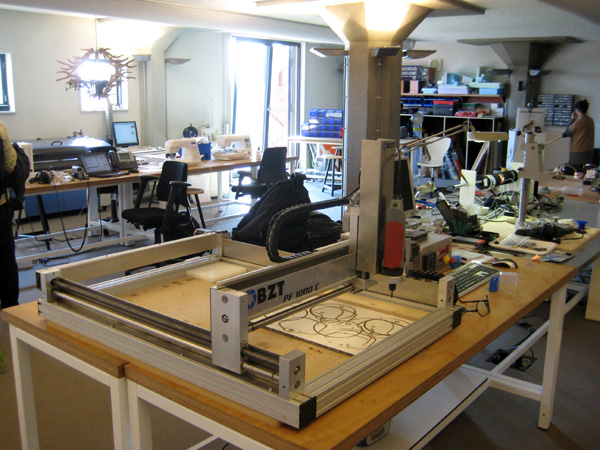Under the title Third places: an emancipation in acts ? the journal Sociologies pratiques, published by the Presses de Sciences Po, devotes a dossier to third places and fablabs.
Cynthia Colmellere, Delphine Corteel, Volny Fages and Stéphanie Lacour, who coordinated this dossier, in an introductory article ("Untangling the skein of third places: genealogical attempts"), set out to place fablabs in a double genealogy.
"The history of makers is first tied to a history of computing that highlights the importance of hackers. This genealogical framework then moves from the East Coast to the West Coast of the United States, with a second generation of hackers who, during the 1970s, tinkered with computer hardware. It is in this "Californian melting pot" of the 1970s that the "founding tensions" emerge, which will profoundly structure the makers' movement until today: "between hobby and business, between libertarianism and commercial liberalism, between sharing and commercial appropriation, the world of computer enthusiasts splits up at that time ."The world of makers, they explain, "is not exactly superimposed on a world of computer enthusiasts, of high-tech software or computer tinkerers. The places that bring these communities together are also marked by a strong emphasis on making things, on making them yourself, on DIY (Do it yourself)." It is part of another tradition: that of the various movements that value, " since the eighteenth century, the craft, the craft, the "beautiful work", the DIY, until the world of DIY and punk culture. The DIY is seized here as a set of practices constituting itself in "counterpoint to the dominant productive order".The interviews in this issue focus on the questions " of emancipation, the collective, the right ways to name real activities, and the rhetorical and strategic uses of language vis-à-vis the outside world, especially potential funders."
Like the sociological surveys published in this dossier, they are also part of a rather particular moment, that of the institutionalization of fablabs, around, in particular, the French Fablab Network.
By analyzing the experience of setting up a fablab in a Parisian university, Jean-Marc Galan and Francesca Musiani show the gap between the ambitions and objectives announced, the means made available and the concrete results. They raise the question of the role of the fabmanager in the animation of the place.
"The desire for emancipation can also come up against a certain number of constraints of various kinds, first and foremost the need for the users of these places to already have certain skills in order to be able to appropriate the machines, tools, knowledge and know-how. This is what Jérôme Lamy shows in his article about a fablab located in a rural area with few technological resources.Antoine Larribeau, for his part, explores, in the current period, the relationship between the conditions of exercise of the engineering profession and hacker commitment. "He opens up an avenue that has been little explored until now, questioning the link between the relationship to work in industry and involvement in activities that fall under the hacker ethic. He hypothesizes that hackerspaces and, more broadly, fablabs can constitute spaces for work on the side, but also for salaried work that are more fulfilling than those offered by industry for those who hold a radical ethic.
Contents- Cynthia Colmellere, Delphine Corteel, Volny Fages and Stéphanie Lacou: Untangling the web of third places: genealogical attempts
- Interview with Matei Gheorghiu
- Interview with Julien Bellanger
- Interview with Évelyne Lhoste
- Jean-Marc Galan and Francesca Musiani: Creating a fablab at the university: human and institutional issues
- Jérôme Lamy : Fablab in the countryside : action plans and investment articulations
- Antoine Larribeau : From the amateur hacker to the computer scientist, learning to hijack : a study of the socialization of computer hacking
Référence :





